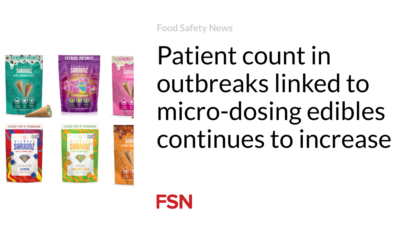Health
High consumption of ultra-processed foods linked to greater mortality risk

London, England – February 16: A photo illustration of ‘Ultra Processed’ foods on February 16, 2018 … [+]
A study that analyzed data from more than 540,000 older adults found that those who relied on a diet with higher amounts of ultra-processed foods were about 10% more likely to die sooner than those who ate a balanced diet.
Lead author Erikka Loftfield of Stadtman Investigator at the National Cancer Institute and colleagues spent nearly 30 years observing the dietary behaviors and preferences of more than half a million older adults in the United States, between the ages of 50 and 71.
“We found that highly processed meats and soft drinks are among the subsets of ultra-processed foods most strongly associated with mortality risk and that eating a diet low in these foods is already recommended for disease prevention and health promotion,” Loftfield said in a study . press release. She presented the research results at the American Society for Nutrition’s annual meeting, Nutrition 2024, held in Chicago from June 29 to July 2, 2024.
“Our study results support a larger body of literature, including both observational and experimental studies, indicating that the intake of ultra-processed foods negatively impacts health and longevity,” Loftfield added. “However, there is still much we don’t know, including which aspects of ultra-processed foods pose potential health risks.”
Ultra-processed foods refer to industrial formulations that are manufactured from food-derived substances and contain additives and preservatives to extend their shelf life. This includes sweet or savory packaged snacks, mass-produced packaged bread, pastries, cakes, breakfast cereals and packaged milk/fruit drinks. Ready-to-eat food products and reconstituted meat products also fall within the definition of ultra-processed products.
In a 2022 study published in The Americal Journal of Clinical Nutrition, researchers wrote: “The general golden rule is to always prefer unprocessed or minimally processed foods and freshly prepared meals over ultra-processed foods.”
The American Heart Association also recommends choosing minimally processed foods over ultra-processed foods. Frozen and canned fruits and vegetables are examples of minimally processed foods.
Researchers have repeatedly linked higher intake of ultra-processed foods to lower fiber, protein, potassium and other micronutrients. In fact, eating especially ultra-processed foods can also increase your weight loss risk overweight or obesity and a greater risk of being diagnosed with hypertension, type 2 diabetes, coronary heart disease, breast cancer, liver disease, depressionor Crohn’s disease.
According to a 2024 study published in Neurology, Increasing intake of ultra-processed foods by as little as 10% is associated with an increased risk of cognitive impairment and stroke. This is because ultra-processed foods contain additives that can wreak havoc on your gut microbiome and lead to inflammation in your gut. If you develop leaky gut, it will cause inflammatory molecules to enter the bloodstream and travel to the brain, affecting brain function.
The study found that drastically cutting back on eating ultra-processed foods and switching to a Mediterranean diet helped maintain brain health.
Some other harmful, ultra-processed foods to avoid on a daily basis include ham, hot dogs, frozen fries, chips, packaged fruit-flavored yogurt, baking mixes, instant noodles/soups, and cookies.













